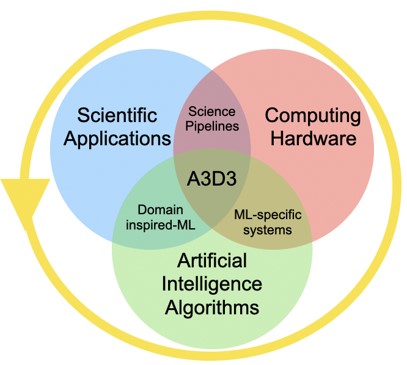
The Wisconsin IceCube Particle Astrophysics Center (WIPAC) at the University of Wisconsin–Madison is excited to begin collaboration with researchers at peer universities as part of the Accelerated AI Algorithms for Data-Driven Discovery (A3D3) institute, a multidisciplinary entity funded and established by the National Science Foundation’s Harnessing the Data Revolution (HDR) program. On September 28, 2021, NSF announced $75 million in funding to establish five new HDR institutes, including $15 million for A3D3.
The goal of A3D3 is to construct the institutional knowledge essential for real-time applications of artificial intelligence (AI) in any scientific field to advance knowledge and accelerate discovery. As scientific data sets become larger, algorithms to process these data become proportionally more complex. In response, AI has emerged as a solution to efficiently analyze these massive data sets.
The combination of AI and new processor types is leading to a revolution in the way we analyze data by minimizing the time needed to perform the most advanced of analyses and allowing us to address the challenges brought about by the omnipresent onslaught of data.
To take full advantage of fast AI, A3D3 targets fundamental problems in three fields of science: high-energy physics, multimessenger astrophysics, and systems neuroscience. Their efforts with multimessenger astrophysics are particularly useful to WIPAC, the headquarters of operations for the IceCube Neutrino Observatory, the world-leading astrophysical neutrino detector buried in the glacial ice sheet at the South Pole. In addition, WIPAC leads projects to expand IceCube and hosts a group of researchers that belong to the IceCube scientific collaboration of over 350 scientists around the globe.
Within the field of multimessenger astrophysics, A3D3 is working to integrate AI for prompt and computationally efficient processing of data from telescopes, neutrino detectors, and gravitational-wave detectors to quickly identify astronomical events corresponding to the most violent phenomena in the cosmos. The ability to identify and further distribute these events as astronomical alerts enables the entire transient astronomy community to cross-correlate observations and understand astrophysical phenomena across multiple different disciplines.
IceCube—both the currently operating detector and future facility enhancements—will benefit from participation in the A3D3 institute and contribute to its success by providing concrete applications in multimessenger astrophysics where AI algorithms and techniques offer revolutionary advances to existing data processing pipelines. “This is a great opportunity for IceCube researchers to work with AI experts to accelerate progress in the field of multimessenger astrophysics,” says Kael Hanson, director of WIPAC and IceCube’s director of operations.
IceCube data analysis has documented the potential of AI and machine learning in a recent publication where IceCube researchers used machine learning to improve the angular reconstruction of neutrino events by a factor of 2. Machine learning boosts performance with decreased computational burden, which is particularly well suited for IceCube, enabling high fidelity of near real-time alerts of interesting transient phenomena to be sent to the broader astronomical community. These fast online reconstructions of IceCube events get messages out within a minute to radio, optical, gamma-ray, and gravitational-wave facilities to instigate follow-up observations.
The A3D3 team reflects a collaborative effort of researchers from Caltech, Duke University, MIT, Purdue University, UC San Diego, UIUC, University of Minnesota, University of Washington, and the University of Wisconsin–Madison.
Media contacts:
Kael Hanson, WIPAC Director
WIPAC Communications
608-515-3831
